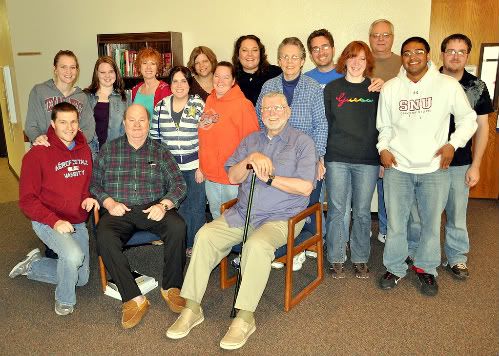Again, borrowed from another site,
here:
--
Can’t remember where you put your keys? Blanked on your child’s name and the church you go to?
This isn’t a sign that you’re getting old.
Zaldy S. Tan, MD, director of the Memory Disorders Clinic at Beth Israel Deaconess Medical Center in Boston, says it’s a sign of how busy we are.
“When we’re not paying good attention, the memories we form aren’t very robust, and we have a problem retrieving the information later.”
If you struggle with the simple things of life, then memorizing John 3:16 probably seems intimidating. And putting away Romans 8 sounds down right impossible.
In truth, it’s not as hard as you think. Yes, it takes effort and time. But there are some simple strategies to help you.
Why Even Memorize Scripture?
Lately I’ve seen a lot of interest in memorizing Scripture. Tim Challies hosts his own Bible memory series. And Ryan Ferguson awes audiences with his dramatic recitation of Scripture.
But one of the most compelling reasons for memorizing Scripture I found in John Piper’s sermon If My Words Abide in You: memorizing Scripture shapes the way I view the world by conforming to God’s viewpoint.
So, whether you want to memorize one verse or an entire book, try these strategies to help you remember more.
1. Read it repeatedly. Did you know you can memorize Scripture during your morning devotion? Instead of zipping through your reading for the day, pause and camp on one verse for a long time. You won’t regret it.
2. Pay attention. Sounds obvious, but often ignored. Simply forcing yourself to be aware of what you are reading can help you internalize the words. Repetition will make the mind wander. What you have to do is bring it back.
3. Visualize what you are reading. Take Psalm 1:1 for example. “Blessed is the man who does not walk with the wicked nor stand in the way of the sinner nor sit in the seat of the mocker.” Your first tasks is to see the three actions here: walking, standing and sitting. If you can see the three main actions, then you can start to memorize the surrounding words.
4. Create anchor words. In the above example, your anchor words are “walking,” “standing” and “seating.” In Colossians 1:15, my anchor words are image, invisible and firstborn. Whenever I get lost while reciting a passage I look for my anchor words to orient myself.
5. Recognize patterns. In Psalm 1:1, after the first line, the next three sentences follow this pattern: a verb, a noun and a modifier. Think of each of these as a bucket you drop the appropriate word into.
6. Start with the easy. Now, some passages are easier to remember than others. Psalm 1, easy. A page from Romans, hard. On your first effort at memorizing large chunks of Scriptures, don’t tackle Romans. Build some confidence first by memorizing Psalm 1 or the Sermon on the Mount.
7. Stagger. Sorry, not like you were drunk. What I mean is memorize an easy passage then a hard passage then an easy. Give your brain a break. This way you’ll avoid burnout.
8. Build memorable associations. If you want to remember difficult section of scripture like Romans 1:18-20, it helps to imagine God hovering like a brooding mountain over the world to represent all three verses. This is a robust picture hard to forget.
9. Anchor memorable associations in chapters. These rich word pictures can also help you when you’re trying to memorize entire chapters of the Bible. They orient you on a larger scale.
10. Cheat a little. Once you’ve absorbed a hunk of Scripture, don’t be afraid to keep a sheet of paper nearby with keywords or section headings to help you out when you need a reminder.
11. Narrate. Sometimes it helps to describe in your own words what you are trying to memorize. This will also help you build memorable associations, spot keywords and develop anchor words.
12. Stick to a ritual. I find it easier to memorize Scripture in my car–I have a long commute–and before I sleep. Especially early on in the process of memorizing, I can’t remember my passage as easily anywhere else except these places. So, until I gain more confidence, I stick to this ritual.
13. Sing it. Try opera. Or a musical. The point is to be dramatic. As if you were in a play. [This is my favorite trick, by the way.]
14. Try mnemonic devices. Many of us learned ROY G BIV to remember the colors of the rainbow. Make up your own device to memorize anchor words or more. In Psalm 1:1, your device would be WSS, or walk, stand and sit.
15. Enlist your body. If mnemonic devices aren’t your cup of tea, use body parts. Classic example of this is Ephesians 6:10-18, the armor of God. Waist, chest, feet, forearm and head complete the armor and can help you navigate through this lengthy passage.
16. Repeat the alphabet. Say you just can’t remember that big word in 1 John 2:2. Run through your ABCs. When you get to P, it should trigger the word escaping you: propitiation.
17. Type it. One way to memorize something like John 1:1-3 is to type it into your computer. Not once. Not twice. But ten times. Maybe more. Your call.
18. Hear it. After you’ve typed it, next, read it aloud and record it. Then listen to the recording several times.
Don’t forget: As you work on memorizing, turn off the TV, unplug your iPod and shut down your computer. You’ll retain more.
Your Turn
So, how do you memorize large chunks of information…whether it’s a chapter from the Bible, a poem or a speech? Got any tricks that I didn’t mention? Wanna share them? I look forward to hearing from you.











































